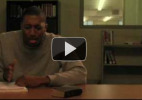In Time: Movie Review
Are you spending your time wisely?
Running out of time?
In Time is the latest movie from Andrew Niccol, writer/director of such thought provoking gems as Gattaca (1997), Lord of War (2005) and screenwriter of the clever Truman Show (1998). He enjoys creating alternate realities where genetic modification has changed society. He uses these ideas to explore modern-day moral dilemmas.
Set at some fairly unattractive point in the future, In Time paints a world where ageing has been genetically altered to stop at 25, after which point each person is given just one more year to live. Each person has a green neon timer silently ticking the seconds away on their left forearm. Time is now the one thing that everybody needs; it can be traded for goods and services, gambled, shared between friends and family or stolen by thuggish “Minutemen.”
There are those who struggle through with only a little bit of time – the blue collar workers of the ghetto who literally live “day to day,” working to earn enough time to make it til tomorrow. Then there are the wealthy members of “New Greenwich” who have so much time, they could effectively live forever. It is suggested, though never adequately explored, that the wealthy deliberately increase the cost of living in the ghetto to force the poor to run out of time, thus keeping the ageless population in check – “Darwinian capitalism” I think was the phrase.
Giving time to the poor
Struggling through from one day to the next is Will Salas (Justin Timberlake), who’s managed to make his 'final year' last for three so far. While drinking with a buddy, Will happens to run into the suicidal Henry Hamilton (Matt Bomer) and… look, I won’t bore you with details of the plot (it's too slow and complicated). Needless to say, Will eventually hooks up with a girl, Sylvia Weis (Amanda Seyfried) and the two kiss, then set about trying to right the wrongs of this society by stealing time from Weis’ fabulously wealthy father and distributing it to the needy, all the time being pursued by a steely-eyed cop, the veteran 'Timekeeper Leon' (Cillian Murphy). Fill in the minutes with some wooden acting, a few car chases and plenty of time-based puns and you have 109 minutes of your life you can never earn back.
What disappointed me most about this film was the lack of decent discussion of the central moral issue – the link between poverty and life expectancy – which is as real in our Australian situation as it is anywhere else in the world. Is it right for some to lazily live forever while others struggle to make it to tomorrow? Our schools, governments, churches and media may not talk about it often, but in Australia today, some members of society, especially Indigenous Australians, live in real poverty by most indicators. Whereas the average Australian can expect to live to 80 or beyond, the average Indigenous Australian has a life expectancy of only 63, with additional factors such as high unemployment and poor health often stretching this difference to more. The same difference, although less marked, exists in Niccol’s native New Zealand. In Time, however, offers no answers to this issue. The wealthy appear content to repeat an unsympathetic mantra: “for some to be immortal, many must die,” while Salas and Weis’ smash-and-grab, Bonnie & Clyde meets Robin Hood solution is simplistic at best, downright childish at worst.
A Christian approach to poverty
As always, Jesus offers an alternative solution which is neither unsympathetic nor overly simplistic. To those who have plenty of everything – time and resources – Jesus reminds us to look to the needs of others before ourselves. Many times in the gospels, Jesus encourages, commands and commends looking after those in poverty. “Sell everything you have and give to the poor,” Jesus commands the rich ruler in Luke 18, “and you will have treasure in heaven.” Unfortunately for everyone, this is not an easy command to follow. And to those who are struggling with many needs and worries, Jesus reminds us of who is really in charge of tomorrow. “Can any one of you by worrying add a single hour to your life?” asks Jesus in Matthew 6, “Seek first God’s kingdom and his righteousness, and all the things you need will be given to you as well.” This too is confronting to follow.
Ultimately, the Bible reminds those of us who yearn for immortality that our days on Earth are numbered, the 'invisible green neon clock' is constantly ticking, and there is no way we can steal, borrow or earn even another second beyond that which is allotted to us. The question therefore for all of us is not how much time do you have left, but how will you seek first God’s Kingdom in the time you’ve got?
To find out more about how Christians can help those most in need, you can check out websites like Compassion & The Micah Challenge.






